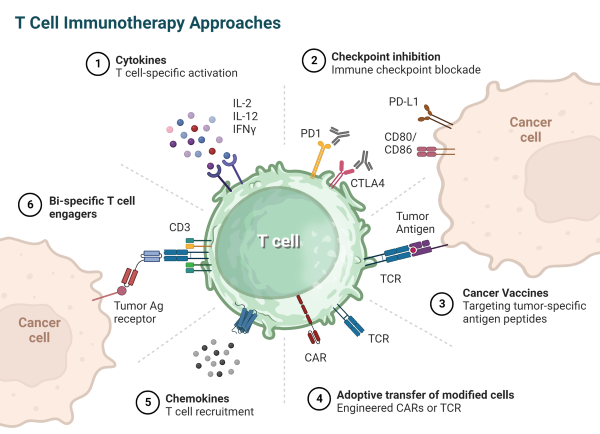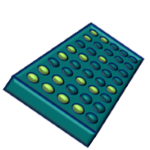Cancer & Immunotherapy
Immunotherapy is revolutionizing cancer treatment by unleashing the power of the body’s immune system against tumors.
Immunotherapy is revolutionizing cancer treatment by unleashing the power of the body’s immune system against tumors.
Cancer is a complex group of diseases characterized by the uncontrolled growth and spread of abnormal cells. It can affect virtually any tissue or organ in the body and may manifest as benign tumors, which do not spread, or malignant tumors, which invade surrounding tissues and can metastasize to other parts of the body. Cancer develops due to genetic mutations that accumulate over time, often triggered by factors such as genetic predisposition, environmental exposures, or lifestyle choices. Traditional cancer treatments include surgery, chemotherapy, and radiation therapy, but these approaches can have significant side effects and may not be effective for all types of cancer. Developments in Immunotherapy have led to targeted therapies with more effective outcomes.
The immune system can recognize and eliminate abnormal cells, including cancer cells, but tumors often develop mechanisms to evade detection. Immunotherapy works by enhancing the immune response or removing the barriers that prevent the immune system from attacking cancer cells effectively. Various types of immunotherapies are being developed and used, including checkpoint inhibitors, CAR-T and TCR-T cell therapy, CAR-NK cell therapy, bivalent or multi-specific immune cell engagers, engineered cytokines, and cancer vaccines. These treatments have shown remarkable success in certain cancers, offering the potential for long-lasting and targeted responses with fewer side effects compared to traditional therapies.

The immune system can recognize and eliminate abnormal cells, including cancer cells, but tumors often develop mechanisms to evade detection. Immunotherapy works by enhancing the immune response or removing the barriers that prevent the immune system from attacking cancer cells effectively. Various types of immunotherapies are being developed and used, including checkpoint inhibitors, CAR-T and TCR-T cell therapy, CAR-NK cell therapy, bivalent or multi-specific immune cell engagers, engineered cytokines, and cancer vaccines. These treatments have shown remarkable success in certain cancers, offering the potential for long-lasting and targeted responses with fewer side effects compared to traditional therapies.

Despite the promising advancements in immunotherapy, challenges remain, including identifying the most effective approaches for different types of cancer and managing potential side effects. Ongoing research continues to explore novel immunotherapeutic strategies and combination therapies to enhance the overall effectiveness of cancer treatment and improve outcomes for patients. As the field evolves, immunotherapy holds great promise for transforming the landscape of cancer care and providing new hope for individuals facing this challenging disease.
Discover our enabling solutions to advance immunotherapy and cancer research areas
Immune Checkpoint Molecules

- Inhibition of immune checkpoint molecules is an effective immunotherapy for certain cancers. We provide a diverse set of tools to support immune checkpoint drug discovery.
- View Products
CAR-T Cell Therapy

- Our solutions support critical steps in CAR-T cell therapy research and development spanning from creation of CAR-T cells through to functional testing and validation.
- View Products
TCR-T Cell Therapy

- Engineered T cell receptors provide a promising therapeutic approach to fight cancer by focusing immune cells to target specific antigen peptides.
- View Products
ADC & Antibody-Based Cancer Therapies

- Other antibody-based approaches beyond immune checkpoints have proven to be useful, including antibody-drug conjugates and bispecific/multi-specific T cell engagers. Explore our solutions.
- View Products
NK Cells

- Natural killer cells are innate lymphoid cells that respond to infected cells and tumor cells with potential for use in adoptive cell therapies.
- View Products
Small Molecule Cancer Therapy Targets

- For some cancer targets, non-immune approaches using small molecules may still be required for therapy. Check out our extensive products and services for small molecule drug discovery.
- View Products

